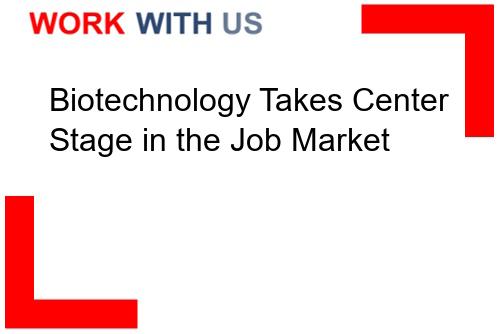Biotechnology has emerged as a prominent field in the job market, taking center stage due to its significant contributions to various industries. With its interdisciplinary nature and potential for innovation, biotechnology offers a wide range of career opportunities for individuals seeking to make a meaningful impact on society.
In recent years, the demand for professionals in the biotechnology sector has skyrocketed. This surge can be attributed to the rapid advancements in genetic engineering, pharmaceuticals, agriculture, and environmental science. Biotechnology has revolutionized these industries by providing solutions to complex problems and improving the quality of life for people around the world.
One of the key areas where biotechnology has made remarkable progress is in healthcare. The development of new drugs, therapies, and diagnostic tools has transformed the way diseases are treated. Biotechnologists play a crucial role in the research and development of these life-saving innovations. They work tirelessly to understand the underlying mechanisms of diseases, identify potential drug targets, and design effective treatments. The demand for skilled professionals in this field is expected to continue growing as the world faces new health challenges.
Moreover, biotechnology has also revolutionized agriculture and food production. With the global population projected to reach 9 billion by 2050, there is an increasing need for sustainable and efficient farming practices. Biotechnologists are at the forefront of developing genetically modified crops that are resistant to pests, diseases, and adverse environmental conditions. These advancements not only ensure food security but also reduce the reliance on harmful pesticides and fertilizers, promoting a more sustainable and environmentally friendly approach to agriculture.
Environmental science is another area where biotechnology has taken center stage. Biotechnologists are actively involved in developing innovative solutions to address environmental issues such as pollution, waste management, and climate change. They utilize bioremediation techniques to clean up contaminated sites, engineer microorganisms to produce biofuels, and develop biodegradable materials to reduce plastic waste. As the world becomes more conscious of the need for sustainable practices, the demand for biotechnologists with expertise in environmental science is expected to rise.
The job market for biotechnology professionals is diverse and offers a wide range of career paths. Graduates with degrees in biotechnology can find employment in pharmaceutical companies, research institutions, government agencies, and even start their own biotech ventures. The field also offers opportunities for specialization, allowing individuals to focus on areas such as genetic engineering, bioinformatics, or bioprocessing.
In conclusion, biotechnology has emerged as a prominent field in the job market due to its significant contributions to various industries. The demand for skilled professionals in biotechnology is on the rise, driven by advancements in healthcare, agriculture, and environmental science. As the world continues to face complex challenges, biotechnologists will play a crucial role in developing innovative solutions that improve the quality of life for people and promote sustainable practices. With its interdisciplinary nature and potential for innovation, biotechnology offers a promising career path for individuals seeking to make a meaningful impact on society.
The growing demand for biotechnology professionals: exploring the job market trends and opportunities
The field of biotechnology has witnessed a remarkable surge in demand for professionals in recent years. As industries across various sectors increasingly rely on biotechnological advancements, the job market for individuals with expertise in this field has expanded exponentially. This comprehensive text aims to explore the current trends and opportunities within the biotechnology job market, shedding light on the growing demand for biotechnology professionals.
One of the key factors driving the demand for biotechnology professionals is the rapid pace of technological advancements. The field of biotechnology encompasses a wide range of disciplines, including genetic engineering, pharmaceutical development, and agricultural biotechnology. As new breakthroughs and discoveries continue to emerge, industries are seeking skilled professionals who can harness these advancements to drive innovation and growth.
The pharmaceutical industry, in particular, has been a major contributor to the increasing demand for biotechnology professionals. With the rising prevalence of complex diseases and the need for more effective treatments, pharmaceutical companies are heavily investing in biotechnology research and development. This has created a plethora of job opportunities for individuals with expertise in areas such as drug discovery, clinical research, and regulatory affairs.
Moreover, the agricultural sector has also recognized the potential of biotechnology in addressing global food security challenges. Biotechnological techniques, such as genetic modification, have enabled the development of crops with enhanced yield, resistance to pests, and improved nutritional content. As a result, agricultural biotechnology has become a promising field, attracting professionals who can contribute to sustainable farming practices and the development of genetically modified organisms.
In addition to the pharmaceutical and agricultural sectors, biotechnology professionals are also in high demand in the environmental and energy industries. As the world grapples with the consequences of climate change, there is a growing need for sustainable solutions. Biotechnology offers innovative approaches to waste management, pollution control, and renewable energy production. Consequently, professionals with expertise in environmental biotechnology and bioenergy are sought after by companies and research institutions alike.
The demand for biotechnology professionals is not limited to traditional industries alone. The emergence of biotech startups and the increasing interest in personalized medicine have further fueled the job market. Startups are leveraging biotechnological advancements to develop novel therapies, diagnostics, and digital health solutions. These companies require a diverse range of professionals, including scientists, engineers, data analysts, and business development experts, to drive their growth and commercialization efforts.
Furthermore, the field of personalized medicine, which aims to tailor medical treatments to individual patients based on their genetic makeup, is heavily reliant on biotechnology. This approach has the potential to revolutionize healthcare by improving treatment outcomes and reducing adverse reactions. Consequently, professionals with expertise in genomics, bioinformatics, and molecular diagnostics are in high demand within the personalized medicine sector.
As the demand for biotechnology professionals continues to grow, it is essential for individuals aspiring to enter this field to acquire the necessary skills and qualifications. A strong foundation in the life sciences, coupled with specialized knowledge in areas such as molecular biology, biochemistry, and bioprocessing, is crucial. Additionally, staying updated with the latest advancements and technologies through continuous learning and professional development is essential to remain competitive in the job market.
In conclusion, the demand for biotechnology professionals is on the rise, driven by technological advancements and the need for innovative solutions across various industries. The pharmaceutical, agricultural, environmental, energy, and personalized medicine sectors are actively seeking skilled individuals who can contribute to their research, development, and commercialization efforts. As the field of biotechnology continues to evolve, professionals with the right expertise and qualifications will find abundant opportunities to make a significant impact in their chosen career paths.
Revolutionizing healthcare: how biotechnology is transforming the medical industry and creating new job roles
Biotechnology has emerged as a game-changer in the healthcare industry, revolutionizing the way medical treatments are developed and delivered. This rapidly advancing field has not only transformed the medical industry but has also created new job roles that were unheard of just a few decades ago. With its potential to address complex diseases, enhance drug development, and improve patient care, biotechnology is paving the way for a brighter future in healthcare.
Enhancing Drug Development
One of the key areas where biotechnology has made significant strides is in drug development. Traditional methods of drug discovery and development were time-consuming and often yielded limited results. However, with the advent of biotechnology, scientists can now harness the power of genetic engineering, genomics, and proteomics to identify potential drug targets and develop more effective therapies. This has led to the creation of new job roles such as bioinformaticians, who analyze vast amounts of genomic data to identify potential drug candidates, and molecular biologists, who manipulate genes to produce therapeutic proteins.
Personalized Medicine
Biotechnology has also paved the way for personalized medicine, a revolutionary approach that tailors medical treatments to an individual’s unique genetic makeup. By analyzing an individual’s genetic information, doctors can now predict their susceptibility to certain diseases and customize treatment plans accordingly. This has not only improved patient outcomes but has also created new job roles such as genetic counselors, who help individuals understand their genetic risks and make informed decisions about their healthcare.
Advancements in Medical Imaging
Biotechnology has also played a crucial role in advancing medical imaging technologies, enabling healthcare professionals to visualize and diagnose diseases with greater precision. Techniques such as magnetic resonance imaging (MRI), positron emission tomography (PET), and computed tomography (CT) scans have become indispensable tools in diagnosing and monitoring various medical conditions. Biomedical engineers, who design and develop these imaging technologies, have become an integral part of the healthcare workforce.
Gene Therapy and Regenerative Medicine
The field of biotechnology has opened up new possibilities in gene therapy and regenerative medicine. Gene therapy involves introducing genetic material into a patient’s cells to treat or prevent diseases caused by genetic mutations. This groundbreaking approach has the potential to cure previously untreatable genetic disorders. Similarly, regenerative medicine aims to restore or replace damaged tissues and organs using stem cells or tissue engineering techniques. These advancements have given rise to job roles such as gene therapists and tissue engineers, who are at the forefront of developing innovative treatments for a wide range of diseases.
Digital Health and Telemedicine
The integration of biotechnology with digital health technologies has revolutionized the way healthcare is delivered, particularly in remote or underserved areas. Telemedicine, enabled by biotechnology, allows patients to consult with healthcare professionals remotely, reducing the need for in-person visits and improving access to medical expertise. Additionally, wearable devices and mobile applications powered by biotechnology have empowered individuals to monitor their health in real-time, leading to the emergence of job roles such as telehealth nurses and digital health app developers.
In conclusion, biotechnology has transformed the medical industry by enhancing drug development, enabling personalized medicine, advancing medical imaging technologies, revolutionizing gene therapy and regenerative medicine, and facilitating the growth of digital health and telemedicine. These advancements have not only improved patient care but have also created a multitude of new job roles that require specialized skills and expertise. As biotechnology continues to evolve, it holds the promise of further revolutionizing healthcare and creating even more opportunities for innovation and growth.
From lab to market: unveiling the entrepreneurial opportunities in biotechnology and the skills required to succeed
The field of biotechnology has witnessed remarkable advancements in recent years, revolutionizing various industries and offering a plethora of entrepreneurial opportunities. From lab to market, this dynamic sector has opened doors for individuals with a passion for science and a drive to transform innovative ideas into successful ventures. However, navigating the biotechnology landscape requires a unique set of skills and knowledge to thrive in this competitive arena.
One of the key skills essential for success in biotechnology entrepreneurship is a deep understanding of scientific research and development. Entrepreneurs in this field must possess the ability to translate complex scientific concepts into practical applications that can address real-world challenges. This requires a strong foundation in biology, chemistry, and other related disciplines, enabling them to identify opportunities for innovation and develop cutting-edge solutions.
In addition to scientific expertise, effective communication skills are crucial for biotech entrepreneurs. They must be able to articulate their ideas clearly and persuasively to various stakeholders, including investors, potential partners, and regulatory authorities. Communicating the potential impact and value of their products or services is essential for securing funding, attracting strategic collaborations, and navigating the regulatory landscape.
Entrepreneurial ventures in biotechnology often require substantial financial resources to support research and development efforts. Therefore, financial acumen is another vital skill for success in this field. Biotech entrepreneurs must possess the ability to develop comprehensive business plans, conduct market analyses, and secure funding from diverse sources such as venture capitalists, government grants, and strategic partnerships. They must also have a keen understanding of intellectual property rights and the ability to protect their innovations through patents and other legal mechanisms.
Adaptability and resilience are qualities that cannot be overlooked in the biotechnology industry. Entrepreneurs in this field must be prepared to navigate through numerous challenges, including regulatory hurdles, scientific setbacks, and market fluctuations. The ability to quickly adapt to changing circumstances and persevere in the face of adversity is crucial for long-term success.
Networking and collaboration are also essential skills for biotech entrepreneurs. Building a strong network of industry professionals, scientists, and potential partners can provide valuable insights, mentorship, and access to resources. Collaborations with academic institutions, research organizations, and other entrepreneurs can accelerate the development and commercialization of innovative biotech products.
Furthermore, a keen understanding of the market and its dynamics is vital for biotech entrepreneurs. They must conduct thorough market research to identify unmet needs, assess competition, and determine the commercial viability of their products or services. By staying abreast of industry trends and customer preferences, entrepreneurs can position their ventures strategically and seize market opportunities.
Successful biotech entrepreneurs also possess strong leadership and team-building skills. Assembling a talented and diverse team is crucial for driving innovation and achieving business objectives. Effective leadership ensures that the team remains motivated, focused, and aligned with the company’s vision. Moreover, the ability to inspire and empower team members fosters a culture of creativity, collaboration, and excellence.
In conclusion, the biotechnology industry offers a wealth of entrepreneurial opportunities for individuals with a passion for science and a drive to make a difference. To succeed in this dynamic field, biotech entrepreneurs must possess a unique blend of scientific knowledge, communication skills, financial acumen, adaptability, networking abilities, market understanding, and leadership qualities. By harnessing these skills and leveraging the power of innovation, biotech entrepreneurs can unlock the potential of their ideas and contribute to advancements that benefit society as a whole.
Ethical considerations in biotechnology: examining the impact on job market dynamics and the need for responsible innovation
Biotechnology has emerged as a powerful force in shaping the future of various industries, from healthcare to agriculture. As this field continues to advance at an unprecedented pace, it is crucial to examine the ethical considerations that arise alongside these technological advancements. One key area of concern is the impact of biotechnology on job market dynamics. Additionally, the need for responsible innovation in biotechnology cannot be overstated, as it plays a pivotal role in ensuring the ethical and sustainable development of this field.
Impact on job market dynamics
The rapid progress in biotechnology has undoubtedly led to significant changes in the job market. While it has created new opportunities and job roles, it has also rendered certain professions obsolete. For instance, the automation of certain laboratory processes through the use of biotechnological tools has reduced the demand for manual labor in these areas. This shift in job requirements necessitates the retraining and upskilling of individuals to remain relevant in the evolving job market.
Furthermore, the emergence of biotechnology has also led to the creation of entirely new job roles. Biotechnologists, bioinformaticians, and genetic counselors are just a few examples of professions that have emerged as a result of advancements in this field. These roles require specialized knowledge and skills, highlighting the need for educational institutions to adapt their curricula to meet the demands of the changing job market.
The need for responsible innovation
Responsible innovation in biotechnology is crucial to ensure that the benefits of this field are maximized while minimizing any potential harm. Ethical considerations must be at the forefront of decision-making processes to prevent unintended consequences. One such consideration is the potential for biotechnology to exacerbate existing social inequalities. Access to advanced biotechnological treatments and therapies should be equitable, and efforts must be made to bridge the gap between developed and developing nations.
Another ethical concern is the potential misuse of biotechnology for nefarious purposes. Genetic engineering, for example, holds immense promise in improving human health, but it also raises ethical questions regarding the potential for designer babies or the creation of genetically modified organisms without proper regulation. Responsible innovation requires robust ethical frameworks and regulations to ensure that biotechnology is used for the greater good of society.
Ethical implications in agriculture and food production
Biotechnology has revolutionized agriculture and food production, offering solutions to challenges such as crop diseases, food scarcity, and environmental sustainability. However, ethical considerations arise when genetically modified organisms (GMOs) are introduced into the ecosystem. The potential impact on biodiversity, unintended consequences on non-target organisms, and the long-term effects on human health are all areas of concern.
Additionally, the patenting of genetically modified seeds by large corporations raises questions about the control and ownership of the world’s food supply. The concentration of power in the hands of a few companies can have detrimental effects on small-scale farmers and agricultural diversity. Ethical discussions surrounding biotechnology in agriculture must address these concerns and strive for a more equitable and sustainable food system.
Privacy and data security in biotechnology
As biotechnology advances, the collection and analysis of vast amounts of genetic and personal data become increasingly prevalent. This raises significant privacy and data security concerns. Genetic information is highly personal and can reveal sensitive information about an individual’s health, ancestry, and predisposition to certain diseases. Safeguarding this data from unauthorized access and misuse is of utmost importance.
Furthermore, the potential for genetic discrimination based on an individual’s genetic profile is a pressing ethical concern. Employers, insurance companies, and other entities may misuse genetic information to make decisions regarding employment, insurance coverage, or access to certain services. Striking a balance between the benefits of genetic data analysis and protecting individuals’ privacy rights is a critical ethical consideration in the biotechnology field.
Ethical considerations in biotechnology are essential to navigate the complex challenges and opportunities that arise from technological advancements. The impact on job market dynamics, the need for responsible innovation, ethical implications in agriculture and food production, and privacy and data security concerns are just a few of the many areas that require careful examination. By addressing these ethical considerations, society can harness the full potential of biotechnology while ensuring its responsible and sustainable development.



